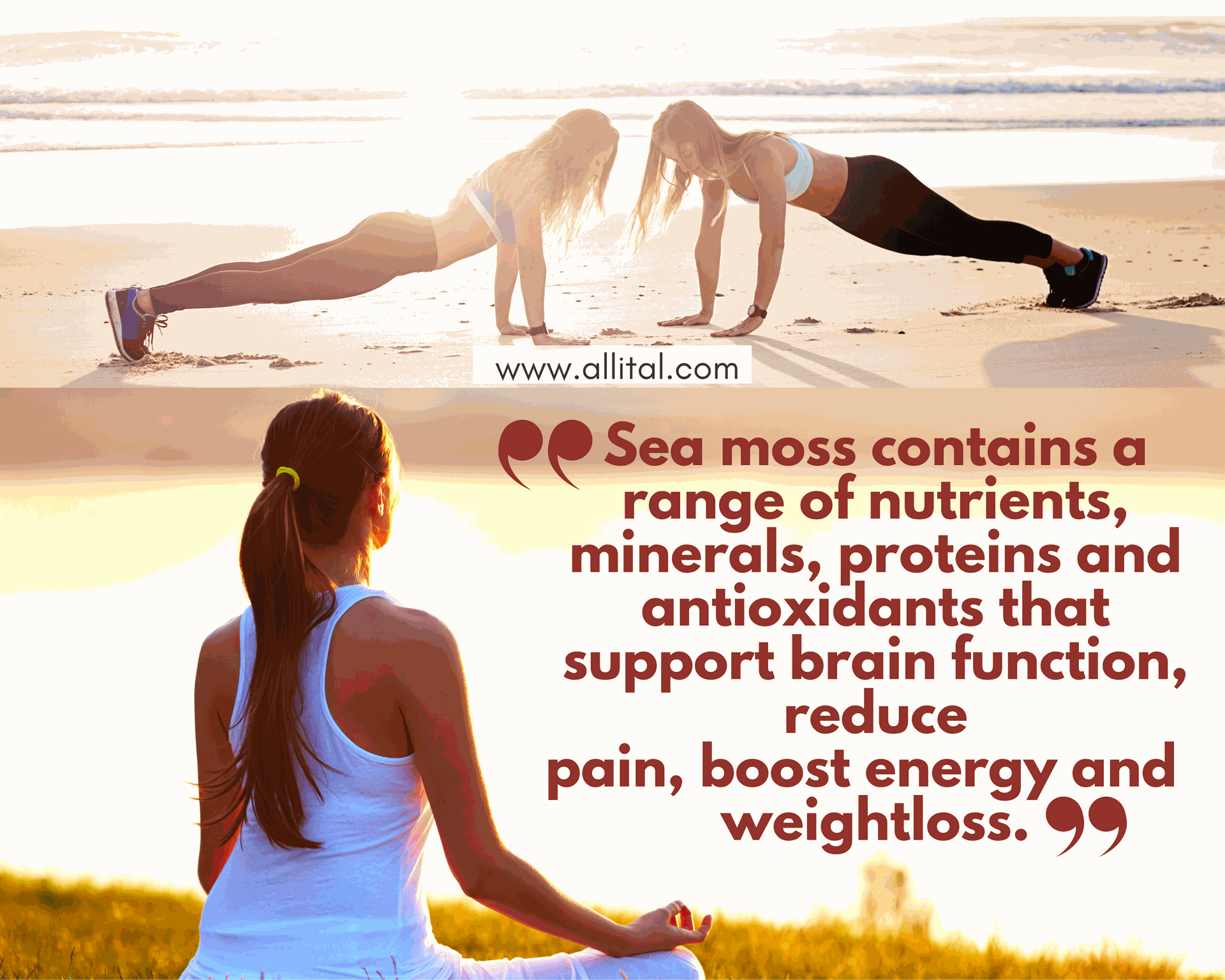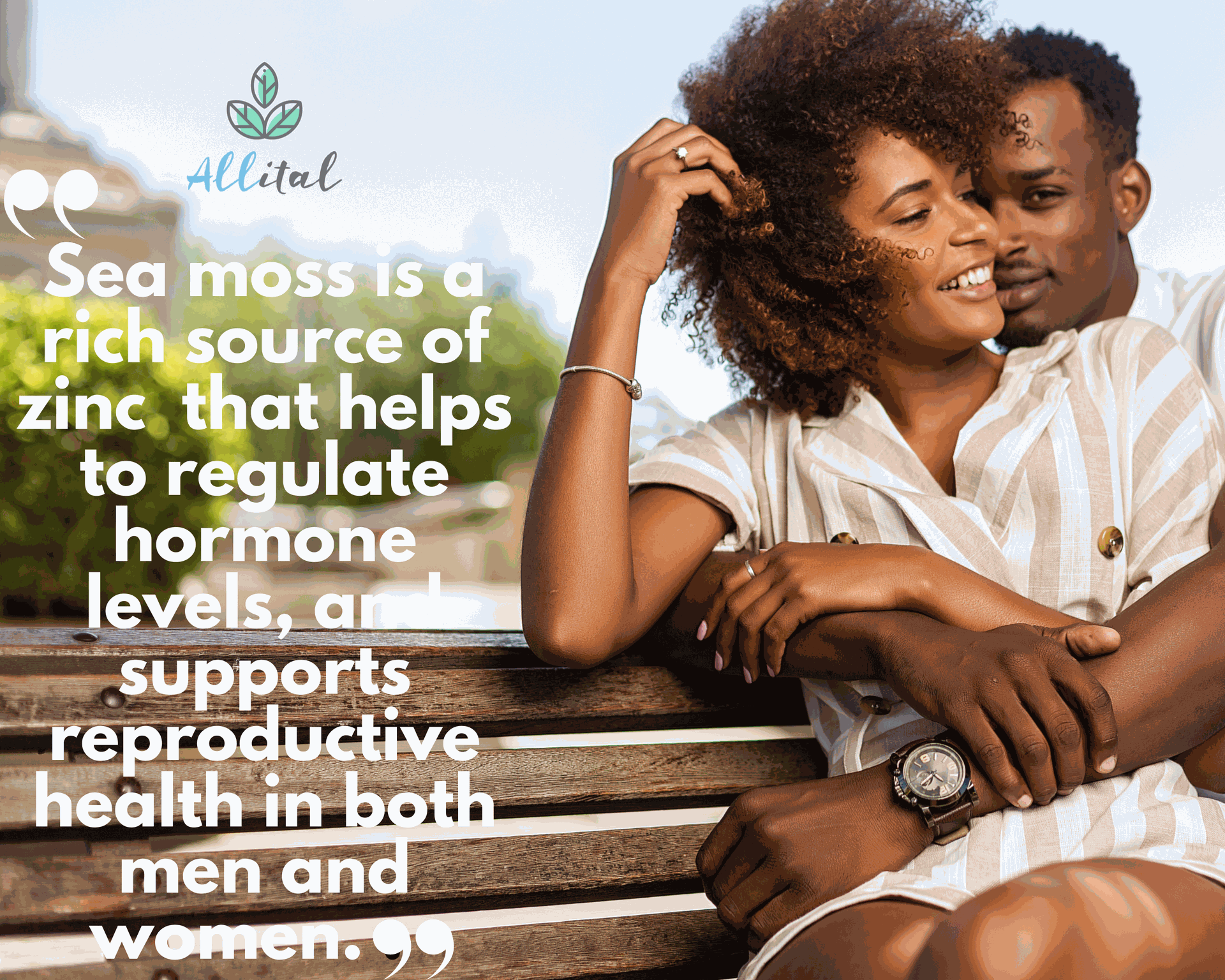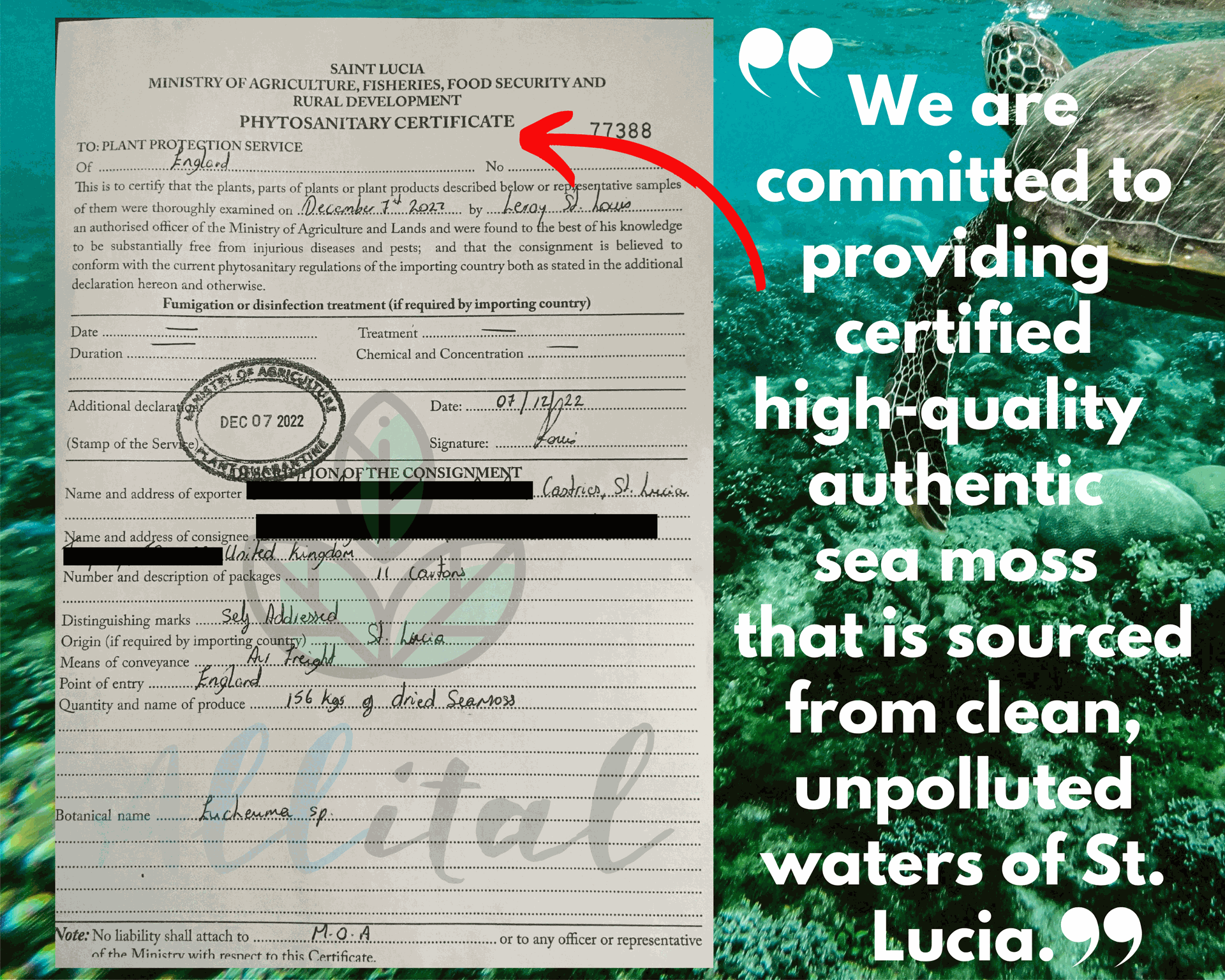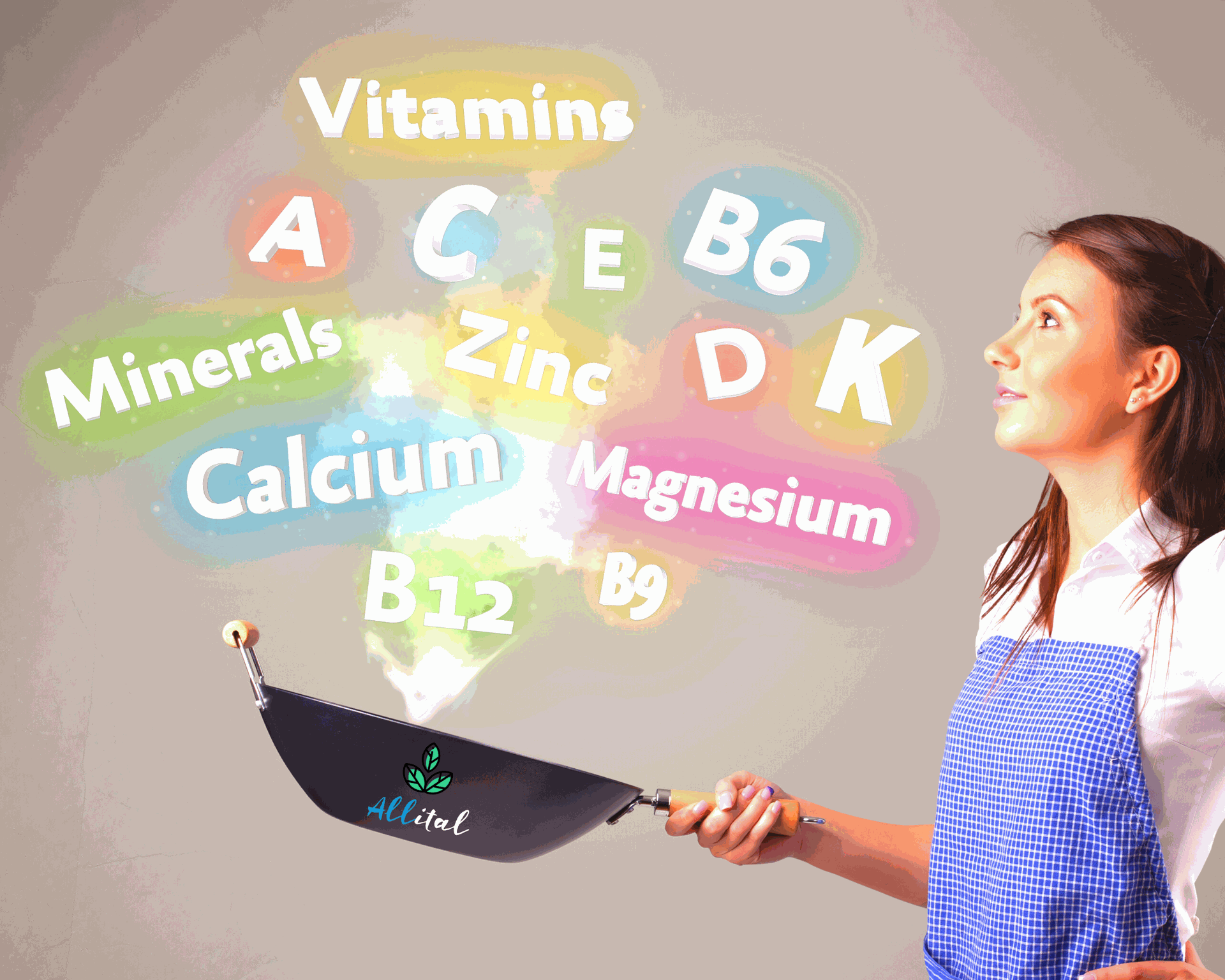Welcome to our guide on sea moss, a type of red algae that has been gaining popularity in recent years due to its numerous health benefits. In this guide, we have explored what sea moss is, the numerous health benefits of sea moss, including its high nutrient content and prebiotic properties, and how to incorporate it into your diet. We will also provide tips on where to buy high-quality sea moss and how to store it properly.
What is Sea Moss?
Sea moss, also known as Irish moss, is a type of seaweed that grows in the Atlantic Ocean, mainly along the rocky coasts of North America, Europe, and also harvested in pristine unpolluted open waters of the Caribbean islands such as St. Lucia and Jamaica. It has been used for centuries in traditional medicine to treat a variety of ailments, including respiratory illnesses, digestive issues, and skin problems.
Nutritional Benefits of Sea Moss: The Overview
Sea moss is a nutrient-dense food that is rich in vitamins, minerals, and antioxidants. It is an excellent source of iodine, which is essential for thyroid function and metabolism. It also contains significant amounts of potassium, calcium, magnesium, and iron, all of which are crucial for maintaining strong bones, healthy skin, and proper organ function.
In addition to these minerals, sea moss is high in vitamin C and vitamin B12, which are important for immune system function and energy production. It also contains a type of fiber called carrageenan, which has been shown to have prebiotic properties, helping to promote healthy gut bacteria.
Nutritional Benefits
Two tablespoons (10g) of Irish moss (raw) contains approximately:
- 4.9 kcals/21 KJ
- 0.15g protein
- 0.02g fat
- 1.23g carbohydrates
- 0.13g fibre
- 7.2 mg calcium
- 0.89mg iron
- 14.4mg magnesium
- 0.19mg zinc
Reference: U.S. Department of Agriculture: Agricultural Research Service
The Top 12 Nutritional Benefits of Sea Moss
At our company, we believe in the power of nature to heal and nourish our bodies. One of the most exciting discoveries we've made in recent years is the numerous incredible sea moss benefits. In this article, we'll explore the top 12 reasons why you should incorporate sea moss into your diet for optimal health and wellbeing.
1. High in Essential Vitamins and Minerals
Sea moss is an excellent source of essential vitamins A,B,C,D, E, K and minerals that our bodies need to function properly. It's particularly rich in iron, calcium, magnesium, zinc and potassium. These minerals are essential for healthy bone and muscle function, and they also help to regulate blood pressure. It's also especially high in iodine, which is important for maintaining a healthy thyroid gland. [1]
2. Promotes Healthy Digestion
Sea moss is a great source of dietary fiber, which is essential for maintaining good digestive health. It helps to regulate bowel movements and prevent constipation. Additionally, sea moss contains prebiotics, which help to feed the good bacteria in our gut, promoting a healthy digestive system. [2, 3]
3. Boosts Immunity
One of the amazing sea moss benefits is that it is packed with antioxidants that help to fight off free radicals and prevent cell damage. It is also known for its immune-boosting properties, thanks to its high levels of vitamin C, which is essential for a healthy immune system. Consuming sea moss regularly can help to boost your body's defenses making it more resilient to infections and diseases. [4]
4. Helps to Detoxify the Body
Sea moss is a natural diuretic, which means that it helps to flush toxins and excess fluid from the body. It's also rich in iodine, which is essential for maintaining a healthy thyroid gland. This gland is responsible for regulating metabolism, and a healthy thyroid can help to support overall health and well-being. Sea moss is also rich in chlorophyll, which is a powerful detoxifying agent. It can help to remove toxins from the body and promote healthy liver function. [5]

5. Improves Skin Health
Sea moss contains high levels of collagen, which is essential for healthy skin. Collagen helps to keep skin supple and hydrated, and it also helps to reduce the appearance of fine lines and wrinkles. Additionally, sea moss contains a range of nutrients, including vitamin A, vitamin C, and antioxidants that can help to protect the skin from damage caused by environmental factors like pollution and UV radiation and also can help to prevent signs of aging, reduce inflammation, and promote collagen production.
Sea moss can be easily incorporated into daily beauty and skin care routines by simply adding sea moss gel to skin care products such as cleansers, clay masks, lotions, creams, shampoos, conditioners, body scrubs, etc. Sea moss gel can also be added in homemade skincare recipes to boost nutrients or the sea moss gel can be applied directly to the skin as a facial mask to increase skin suppleness or even on minor scrapes, cuts and burns to facilitate faster healing. [6, 7, 8]
6. Aids in Weight Loss
Another incredible sea moss benefit is that it is low in calories and high in fiber, making it an excellent food for weight loss. The fiber in sea moss helps to keep you feeling full for longer, reducing the likelihood of overeating. Additionally, sea moss contains compounds that help to regulate metabolism, which can help to support weight loss efforts and its high nutrient content means that it can help to satisfy hunger and prevent overeating. [9]
7. Helps to Reduce Inflammation
Sea moss contains bioactive compounds that have anti-inflammatory properties including omega-3 fatty acids. These compounds help to reduce inflammation and pain in the body, which is linked to a range of health problems and inflammatory diseases, including arthritis, heart disease, and cancer. [10]

8. Promotes Healthy Brain Function
Sea moss contains a range of nutrients that can help to promote mental clarity and focus, including magnesium, vitamin B12, and omega-3 fatty acids, which are essential for healthy brain function. Omega-3s help to support cognitive function and can help to protect against age-related cognitive decline. [11]
9. Improves Athletic Performance
Sea moss is an excellent source of electrolytes, which are essential for maintaining proper hydration and supporting athletic performance. Sodium, calcium, potassium, phosphate, and magnesium are all electrolytes found in sea moss. Additionally, the high levels of iron in sea moss help to boost energy levels, making it an ideal food for athletes and active individuals. [12]
10. Supports Reproductive Health
A valuable sea moss benefit is that it is a rich source of zinc, which is essential for reproductive health in both men and women. Zinc helps to regulate hormone levels and can help to improve fertility. Additionally, sea moss contains amino acids that help to support healthy reproductive function. [13]

11. Boosts Energy Levels
Sea moss contains a range of nutrients that can help to boost energy levels, including iron, magnesium, and vitamin B12. These nutrients are essential for healthy red blood cell production, which helps to transport oxygen throughout the body. [14]
12. Supports Thyroid Function
As mentioned earlier, sea moss is rich in iodine, which is essential for maintaining healthy thyroid function. This can help to regulate metabolism, energy levels, and mood. [15]
How to Incorporate Sea Moss into Your Diet
There are several ways to incorporate sea moss into your diet. One of the most popular ways is to make a sea moss gel by soaking it in water and blending it with a bit of spring water into a thick smooth paste. This gel can then be added to smoothies, oatmeal, or used as a thickener in soups and sauces.

Another way to use this versatile seaweed and obtain sea moss benefits is to add it to your favorite recipes. It can be used as a natural thickener in vegan cheesecakes or as a binding agent in veggie burgers. You can also sprinkle rehydrated sea moss bits over salads or roasted vegetables for a boost of nutrition.
Where to Buy High-Quality Sea Moss
When buying sea moss, it is important to choose a reputable seller that sources its products from clean, unpolluted waters. Look for organic or wild-crafted sea moss that has been sun-dried, as this is the most natural and nutrient-dense form.
It is also important to choose a supplier that provides transparent information about the sourcing and the phytosanitary certification of its sea moss that is government certified by the Ministry of Agriculture of the source countries.
 A mandatory phytosanitary certificate is administered with each sea moss shipment from The Government of St. Lucia to prove that the quality has been examined and approved.
A mandatory phytosanitary certificate is administered with each sea moss shipment from The Government of St. Lucia to prove that the quality has been examined and approved.
At ALLITAL, we are committed to providing high-quality sea moss that is sourced from clean, unpolluted waters of St. Lucia. We also have a close working relationship with our suppliers and also have familial ties to the island therefore we can guarantee that the sea moss products we are providing are real and we have authentic St. Lucian government phytosanitary certification. Visit our website to learn more about our products and how to incorporate sea moss into your daily routine.
How to Store Sea Moss
To obtain optimum sea moss benefits and to retain its high quality nutritional content, it is important to store dried sea moss and keep it in an airtight container in a cool, dry place away from direct sunlight. Sea moss can be stored for up to a year if kept in these conditions. It is also important to rinse and soak the sea moss thoroughly before using it to remove any residual salt or debris.
Additionally, to store sea moss gel, keep it in a glass airtight container preferably and store immediately in the fridge for up to 2-3 weeks. For longer storage of 3 months or more, put sea moss gel into ice trays and freeze for quick and easy use in smoothies and other frozen desserts or rehydrated sea moss and sea moss gel can be frozen in batches in freezable containers for up to 1 year.
Conclusion
In conclusion, sea moss is a highly nutritious food that can provide a variety of health benefits. It is rich in essential minerals, vitamins, and antioxidants, and has prebiotic properties that promote healthy gut bacteria. By incorporating sea moss into your diet, you can boost your immune system, support proper organ function, and maintain healthy skin and bones. So what are you waiting for? Try adding sea moss to your favorite recipes today and see for yourself why this seaweed has been used for centuries in traditional medicine.
Sources
1. Smyth, PPA. “Iodine, Seaweed, and the Thyroid” (2021) European Thyroid Journal. 2021;10(2):101-108.https://etj.bioscientifica.com/view/journals/etj/10/2/ETJ512971.xml
2. Barbara Borsani et al., “The Role of Carrageenan in Inflammatory Bowel Diseases and Allergic Reactions: Where Do We Stand?” (2021) https://www.ncbi.nlm.nih.gov/pmc/articles/PMC8539934/
3. Natalya N. Besednova et al., “Extracts and Marine Algae Polysaccharides in Therapy and Prevention of Inflammatory Diseases of the Intestine” (2020), https://www.ncbi.nlm.nih.gov/pmc/articles/PMC7345783/
4. Sharmin Suraiya et al., (2022) “Immunity boosting roles of biofunctional compounds available in aquafoods: A review” https://www.sciencedirect.com/science/article/pii/S2405844022008350
5. Smyth, PPA. “Iodine, Seaweed, and the Thyroid” (2021) European Thyroid Journal. 2021;10(2):101-108. https://etj.bioscientifica.com/view/journals/etj/10/2/ETJ512971.xml
6. Ji Hye Kim et al., “Beneficial Effects of Marine Algae-Derived Carbohydrates for Skin Health” (2018), https://www.ncbi.nlm.nih.gov/pmc/articles/PMC6266229/
7. Valentina Jesumani et al., “Potential Use of Seaweed Bioactive Compounds in Skincare-A Review,” Marine drugs (2019), https://www.ncbi.nlm.nih.gov/pmc/articles/PMC6950024/.
8. Adriana P. Januário et al., “Red Seaweed-Derived Compounds as a Potential New Approach for Acne Vulgaris Care” (2021) https://pubmed.ncbi.nlm.nih.gov/34834345/
9. Dietary Fiber. National Library of Medicine. Accessed 24/3/2023. https://medlineplus.gov/dietaryfiber.html
10. Zivkovic, A. M., Telis, N., German, J. B., & Hammock, B. D. (2011). Dietary omega-3 fatty acids aid in the modulation of inflammation and metabolic health. Journal of Nutrition, 141(4), 457-463. doi: 10.3945/jn.110.132029. https://www.ncbi.nlm.nih.gov/pmc/articles/PMC4030645/
11. DiNicolantonio, J.J. & O’Keefe, J.H. (2020). The Importance of Marine Omega-3s for Brain Development and the Prevention and Treatment of Behavior, Mood, and Other Brain Disorders. Nutrients, 12(8). doi: 10.3390/nu12082333.
https://www.ncbi.nlm.nih.gov/pmc/articles/PMC7468918/
12. Fluid and Electrolyte Balance. National Library of Medicine. Accessed 24/03/23. https://medlineplus.gov/fluidandelectrolytebalance.html
13. Favier, A. E. (1992). The role of zinc in reproduction: Hormonal mechanisms. European Journal of Clinical Nutrition, 46(S1), S363-S382. doi: 10.1007/BF02784623. https://bit.ly/3K78djo
14. Houston et al., (2018). Efficacy of iron supplementation on fatigue and physical capacity in non-anaemic iron-deficient adults: A systematic review of randomised controlled trials. BMJ Open, 8(4), e019240. doi: 10.1136/bmjopen-2017-019240. https://www.ncbi.nlm.nih.gov/pmc/articles/PMC5892776/
15. Peter P.A. Smyth, (2021) “Iodine, Seaweed, and the Thyroid” https://www.ncbi.nlm.nih.gov/pmc/articles/PMC8077470/
FDA DISCLAIMER:
The statements made within this website have not been evaluated by the Food and Drug Administration. These statements and the products of this company are not intended to diagnose, treat, cure or prevent any disease.



The Top 12 Nutritional Benefits of Sea Moss